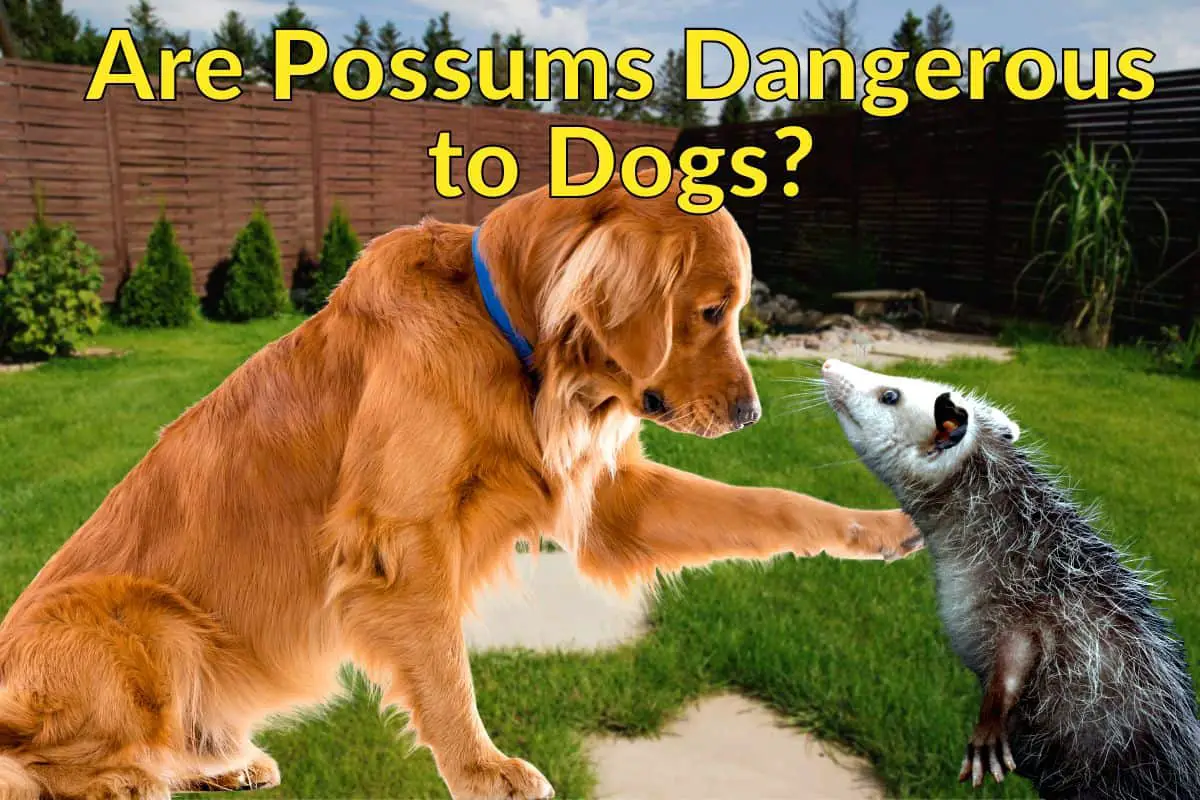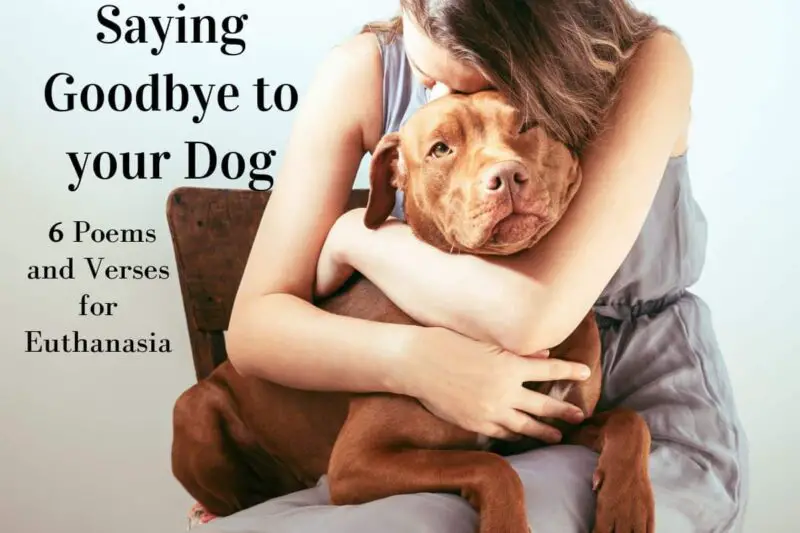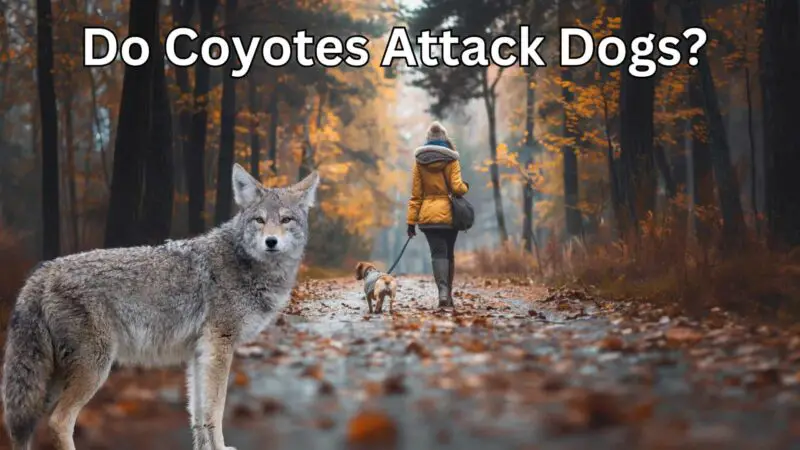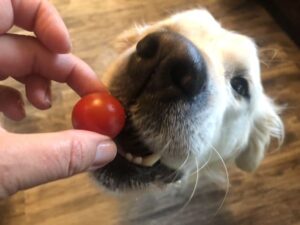Are Possums Dangerous to Dogs?
What You Need to Know
Possums rarely attack dogs, preferring to avoid confrontation by playing dead. If threatened though, possums can scratch or bite dogs. Possums rarely transmit rabies or Lyme disease but can carry fleas and parasites. Keep yards garbage-free and plant possum-repelling herbs to avoid possum encounters for dogs with high prey drives.
If your dog comes face to face with a possum, don’t panic. American possums (opossums) are rarely aggressive and prefer to avoid confrontation at all costs. When threatened though, possums can scratch, bite, or transmit disease-carrying organisms to dogs.
- Know what to do when your dog interacts with a possum
- Recognize the warning signs that a possum is ready to fight
- Learn which diseases possums can carry that might harm your dog
- Understand how possums can help keep your dog safe from tick-borne disease
- Decide if a possum-friendly or possum-free yard is best for your dog
Dogs and Possums: How Do They Interact?
Catching your dog staring at a stark-faced possum can be a bit scary. You and your dog expect them to scurry away like squirrels, rabbits and other small critters.
Instead of running, possums deal with potential predators by freezing, falling to the ground or playing dead. This defence mechanism can confuse dogs, because most dogs naturally want to chase prey.
If you’re lucky, your dog will ignore the possum and walk away. If your dog is curious or has a high prey drive though, he might want to sniff, play, chase, growl, nip, paw, corner or even bite.
Dog breeds with a high prey drive are the ones to keep a close eye on during possum encounters.
Dogs with High Prey Drive
Dogs with a high prey drive instinctually chase, catch and sometimes eat wild animals and will have the hardest time resisting their urges. Certain breeds have enhanced hunting instincts and may be at highest risk for a dangerous encounter.
Find out if you own a high prey dog and learn how to protect them.
Dogs and Possums: What Does a Defensive Possum Look Like?
At the first sign of a threat (noticing your dog), possums protect themselves by going into defensive mode. They may:
- Freeze
- Appear to faint or fall over (play dead)
- Secrete a foul smell from their anal glands. This secretion smells like rotting meat and can trick a dog into believing the possum is dead, so the dog loses interest.
- Urinate or defecate to trick predators into thinking they are dead.
These behaviors ward off many predators that prefer to chase live prey rather than nibble on a carcass.
If this works, your dog will ignore the possum. Within a few minutes to a few hours, the possum will get up and saunter away.
Dogs and Possums: What Does a Threatened Possum Look Like?
If a dog still shows interest and sniffs, paws, growls, chases or even bites a possum, possums will try harder to get the dog to leave it alone.
Mother possums (Jills) are more likely to fight to protect their babies (Joeys).
Warning Signs that a Possum is Ready to Fight
A possum that continues to feel threatened will behave in ways that appear scary. Possums may:
- bare their teeth (possums have 50+ razor-sharp teeth they bare in a wide “alligator-mouth”)
- drool (the drool bubbles out of their nose, leading some people to mistakenly believe the possum has rabies)
- hiss (especially mother possums)
- growl
- run
- bite or scratch
What to Do If Your Dog Comes into Contact with a Possum
If your dog comes face to face with a possum:
- Remain calm. Your relaxed energy tells your dog he is safe and reduces the chances he will react aggressively.
- Remove your dog from the area. Recall your dog or slowly approach to leash and lead him indoors.
- Don’t encourage your dog to chase, bark or approach a possum.
- Don’t let your dog eat possum feces, urine or secretions.
- Wait indoors until the possum leaves. They will eventually walk away when they sense danger has passed. If the possum “played dead”, it could take up to two or more hours to recover and walk away.
- If your dog has come into contact with smelly possum feces, urine or anal gland secretions, prevent the spread of microorganisms by bathing him. Use a safe, homemade odor-reducing shampoo
- If a possum has found its way into your home (eg through a pet door), GENTLY and carefully prod it with the whisk of a broom until it leaves. Never ever harm a possum – they are simply scared.
- Monitor your dog. If your dog has had contact with a possum, monitor for unusual behaviors.
When to Take your Dog to a Vet
Contact your vet:
- If your dog has been bitten or scratched and is bleeding, wounded or infected
- If your dog has injured or eaten a possum (especially if you suspect the possum may have been poisoned)
- If your dogs vomits, loses his appetite, has diarrhea, fever, pain or lethargy
- If you have a puppy or sick dog that may be more prone to diseases from wildlife
Are Possums Dangerous to Dogs? Injuries, Stress & Disease
Dogs – especially those with a high prey instinct – are at risk for injuries, stress and disease from wildlife encounters.
Injuries: Scratches and Bites
Possums have razor-sharp teeth and claws.
Minor scratches and bites involve an exchange of body fluids that can lead to infection or transmit disease. Serious injuries can also cause uncontrolled bleeding that need immediate veterinarian care.
If you think your dog was bitten by a possum, check for a wound. You can usually see two deep punctures from its lower jaw, and four punctures from its top row of teeth. Your dog will probably lick or rub the area. Contact your vet to treat the wound and prevent infection or disease.

What Diseases Can My Dog Get from Possums?
The good news is that possums have a low body temperature which makes it hard to host microorganisms that make dogs sick.
Fleas are a common concern, but rabies and Lyme disease are rare. Some possums carry bacteria and parasites that can lead to canine diseases like leptospirosis, toxoplasmosis, coccidiosis, Chagas Disease and trichomoniasis.
Most healthy adult dogs don’t become seriously ill from exposure to a possum’s body fluids, but puppies and sick dogs can be at increased risk.
If your dog comes into contact with possum saliva, urine, feces, anal gland secretion or contaminated soil or puddles, monitor for symptoms and call your vet.
These are the most common diseases a dog could get from a possum:
Leptospirosis
Leptospira bacteria can be found in the urine of infected animals or contaminated soil and water. Infection can lead to leptospirosis with symptoms of bleeding, jaundice or kidney failure.
Fortunately, leptospira is rarely found in possums, and most dogs are vaccinated.
Toxoplasmosis
Cats (and cat owners) are more likely than possums to carry the toxoplasma gondii parasite. It is estimated that 5.5–29% of possums carry the toxoplasma gondii parasite, which can cause seizures, weakness, lethargy and vomiting in dogs. Healthy dogs with robust immune systems typically don’t show symptoms.
Tip: Pregnant women should avoid exposure to the urine of cats, which commonly carries the toxoplasma parasite.
Coccidiosis
Opossums can carry this diarrhea-causing parasite in their feces. Healthy dogs are mildly affected, while puppies and immunocompromised dogs can experience more serious effects.
Trichomoniasis
Dogs that get this parasite can experience poor appetite, vomiting, pain, weakness, fatigue and swelling. Recovery depends on the dog’s health, length of infection, treatment and whether other organs are involved.
Chagas Disease
Fifteen per cent of opossums carry the parasite that can lead to Chagas Disease in dogs. Infected dogs can show subtle signs like lethargy, pale gums and decreased appetite. In serious cases, this parasite can cause inflammation in the heart, arrhythmias and sudden death.
Lyme Disease
Opossums can carry ticks, but because they groom themselves so well, they ingest 95% of the ticks on their bodies. Ticks are part of their diet, so they also consume around 5000 ticks per year! Since only a fraction of ticks carry the bacteria that causes Lyme disease, it’s unlikely that your dog will become infected from contact with a possum.
In the rare case your dog gets bitten by an infected tick riding on a possum, rest assured that only 5% of infected dogs go on to develop Lyme disease.
Possums are tick-eating heroes!
Rabies
Rabies is very rarely found in opossums, likely due to their low body temperature. Since most dogs are vaccinated against rabies, the risk for contracting rabies from a possum is extremely low.
Fleas
Opossums often host fleas which can jump to your dog. Fleas can cause your dog intense itching, skin breakdown and infection from allergic dermatitis. In some cases, ingesting flea eggs can lead to tapeworm. More serious flea-related diseases include bacterial bartonellosis (coughing, diarrhea, eye and nose irritation, lameness), and anemia (low red blood cells).
After a close interaction with a possum, check your dog for fleas and use natural flea and tick solutions when needed.
Stress and Trauma
Even if a possum does not physically injure your dog, a tense interaction can cause a great deal of stress.
Stressed dogs may:
- pace
- bark or vocalize excessively
- withdraw or hide
- have a poor appetite
- chew, lick or yawn excessively
- show fear aggression
If your dog has had a stressful interaction with a possum, here’s what to do:
- Monitor your dog for changes in behavior, including agitation, barking, withdrawal, poor appetite, signs of fear, aggression or depression
- Sit quietly with your dog until he relaxes and shows no more signs of stress. Many pet owners use massage, Reiki, music, essential oils or crystals to reduce their dog’s anxiety.
- Make some homemade treats with stress-reducing herbs. Our favorite recipes for anxious dogs are La La Lavender Biscuits and CBD Dog Treats. Stressed dogs also benefit from soothing cooled chamomile tea.
Rescue dogs and those with a trauma history can become highly stressed from a wildlife encounter, leading to reactive behaviors, anxiety or depression.
Choose a Possum-Friendly or Possum-Free Yard for your Dog
Possums are typically harmless scavengers and can actually protect your dog against tick-borne diseases like Lyme disease. In some cases though, possums and dogs aren’t a good combination.

Here’s how to decide whether or not to encourage possums to share your dog’s back yard:
Possum-Friendly Yards
Choose to live in peace with possums if:
- Your dog is a healthy adult. Puppies and sick dogs are more vulnerable to diseases that may be carried by possums. They can also be more curious or irritable, leading to confrontation.
- Your dog does not have a high prey drive. Dogs that can ignore critters like squirrels, rabbits or skunks can safely cohabit with possums.
Live in peace with possums by:
- planting fruit-bearing trees
- planting low-hanging shrubs near fences
- composting
- keeping a bird bath filled with fresh water
- supervising your dog
Possum-Free Yards
Choose to keep possums out of your dog’s space if:
- You don’t know how your dog will react to a possum encounter (puppies, new dogs, rescues, ill dogs)
- Your dog has a high prey drive (chases, bites, injures or kills small animals)
- You have a puppy or ill dog that is at risk for disease
Discourage dog-possum interactions by:
- Keeping your dog inside at night when possums are most active (or check your yard first, then supervise your dog)
- Training your dog to recall (“come” on command)
Possum-proof your dog’s space:
- Pick up fruit that has fallen from trees
- Keep garbage lids tightly closed
- Cover compost piles
- Don’t keep pet food outside
- Secure your yard with a fence
- Fill holes under decks and patios with netting, straw, dirt or stones to prevent possums from moving in.
- Plant possum-deterring plants like mint, geraniums and chrysanthemums around your yard
- Spread your dog’s fur around the yard after you’ve brushed him to deter possums
- Clean up possum poop as soon as you notice it. Wear a mask to prevent inhaling any suspended particles that may carry leptospira bacteria
Keep possums out of your dog’s yard by planting mint, chrysanthemums or geraniums.
More Tips to Keep Your Dog Safe
- Keep pet doors locked at night (yes possums can get indoors)
- Consider vaccinating your dog against transmittable diseases such as leptospirosis
- Protect your dog from fleas with natural flea and tick solutions
FAQ
Can a possum spray my dog?
Like a skunk, possums can release foul-smelling substances when they are scared.
Fortunately, unlike a skunk, possums don’t spray their secretions. Curious dogs can take on a foul smell from close contact with possums or contaminated areas. In rare cases, secretions can spread a parasite that causes Chagas Disease.
Is possum urine harmful to my dog?
Possum urine can contain high amounts of bacteria like leptospira or salmonella that can be harmful to puppies and immunocompromised dogs. It also has a distinctive pungent ammonia smell. Keep dogs away from contaminated areas and contact your vet if your dog develops vomiting, diarrhea, weakness, lethargy or poor appetite.
Is possum feces harmful to my dog?
Possum feces can contain parasites and bacteria that can cause leptospirosis, coccidiosis or salmonellosis. Watch for vomiting, diarrhea, weakness, lethargy or poor appetite. Puppies and immunocompromised dogs are at highest risk for disease. Wear a mask when cleaning up possum feces to prevent inhaling any harmful suspended particles.
Is possum anal gland secretion harmful to my dog?
When scared, possums release a green-colored secretion from their anal glands. Its foul, rotting meat smell is designed to ward off predators. In rare cases (< 5%), anal gland secretions contain the parasite that causes canine Chagas Disease.
If your dog has come into contact with possum secretions, watch for lethargy, poor appetite and bathe him with a safe, homemade odor-removing shampoo.
As a holistic canine practitioner, I minimize unnecessary vaccinations, but recommend most dogs be protected against leptospirosis and rabies.
What’s the Difference Between Possums and Opossums?
Like alligators and crocodiles, possums and opossums are similar animals but from different regions. parts of the world. Possums can be found in Australia, New Zealand and China while opossums are native to North America.
Centuries ago, North Americans dropped the ‘o’ in ‘opossum’ and refer to these marsupials simply as ‘possums’.
See the table below for more differences between these two marsupials.
Difference Between Opossums and Possums
| Traits | Opossum | Possum |
| Region | North America | Australia, New Zealand, China |
| Appearance | White & grey bodies Pointed white face Bare, fleshy tail Weighs 8-13 lb 30 inches from nose to tail Course fur | Brown or gold, fluffy tail Pink nose Weighs 3-10 lb 12-22 inches excluding tail Rounded body |
| Origins | Named by Powhatan tribe 1607 “O” dropped from opossum in 1613 | European settlers named them “possums” as they resembled American (o)possums |
| Best Times to See One | At night | At night |
| Behaviors | Avoids contact with animals and people “Plays possum” to avoid confrontation Scavenges fallen fruit, garbage, insects Eats ticks Can uproot plants Tolerates snake venom | Reasonably friendly & approaches people Less likely to “play possum” than opossums Eats leaves, blossoms and fruit |
| Fun Facts | Females are called “Jills” Males are called “Jacks” Babies are called “Joeys” | Female “Jills” give birth to jelly bean sized “Joeys” and carry them in their pouch, like a kangaroo |
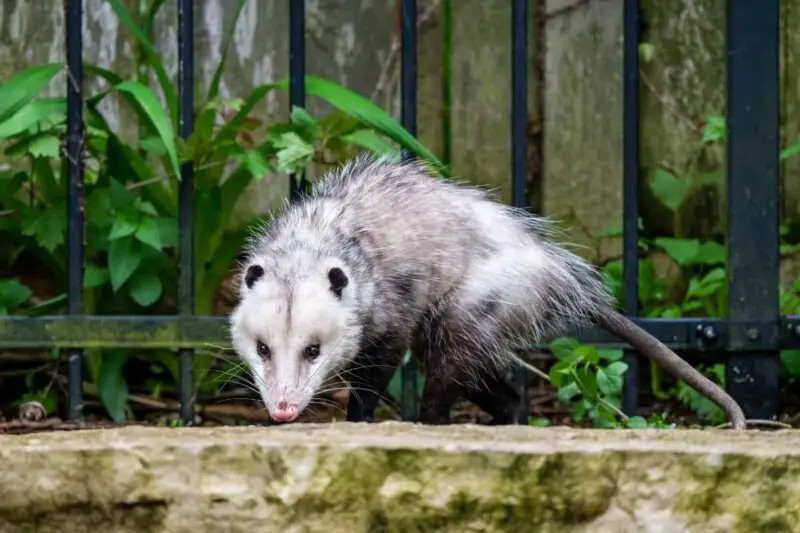
What do I do if my dog gets sprayed by a possum?
When scared, possums can secrete a green, foul-smelling substance from their anal glands, similar to skunks. However, unlike skunks, possums don’t actually spray any distance. The odor smells like rotting meat and can cling to curious dogs. Use a safe, homemade odor-reducing shampoo to remove the smell.
Why do possums play dead?
Possums aren’t natural fighters, but they have skills to survive. To avoid confrontation, they pretend to be dead by “fainting” and stiffening their bodies so predators lose interest. They even secrete foul-smelling fluids that make predators think they are decomposing. For many predators, the chase (prey drive) itself stimulates their appetite. So the clever possum plays dead in the hopes that dogs and other predators leave them alone.
Are possums good to have around?
Many home owners love possums because they eat fallen fruits, slugs, ticks, snakes, small rodents and spilled garbage. Unfortunately, possums can also uproot plants and crops to dig holes for their hideouts, so they can be more of an annoyance to farmers.
Will a possum attack a dog?
It’s highly unlikely that possums will attack a dog. Before fighting, possums do everything they can to avoid confrontation including stiffening their bodies, playing dead, secreting foul-smelling fluids, baring their teeth and hissing. If provoked or injured though, possums can scratch or bite a dog, causing injury, stress or disease.
My dog ate a possum. What should I do?
Dogs that bite or eat a possum risk becoming sick from parasites, bacteria and even poison (if the possum has been intentionally poisoned). Healthy dogs may not experience any issues, but puppies and immunocompromised dogs can become ill. Monitor your dog for lethargy, vomiting, diarrhea, fever or loss of appetite.
If your dog has bitten or eaten a possum, call your veterinarian.
Are possums afraid of dogs?
Possums are passive, docile creatures that prefer to avoid dogs. They respond to their fear by freezing or playing dead. If directly threatened by a curious or high prey drive dog, they can defend themselves by hissing, scratching or biting.
How can I tell if my dog was bitten by a possum?
If you think your dog was bitten by a possum, check for a wound. Possums have razor sharp teeth and you can usually see two deep punctures from its lower jaw, and four punctures from its top row of teeth. Your dog will probably lick or rub the area. Contact your vet to treat the wound and prevent infection or disease.
Do possums carry rabies?
North American possums are very unlikely to carry rabies, due to their low body temperature. Possum scratches, bites and exposure to body secretions pose more of a risk for parasites, bacteria and fleas than rabies.
Be kind to all living beings. Respect the earth we share. 
